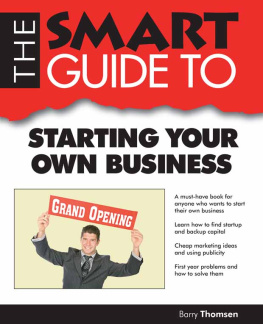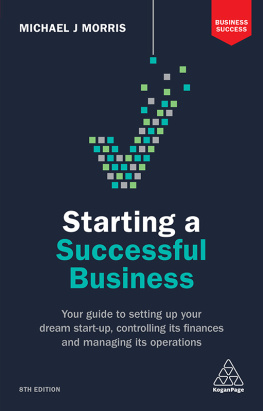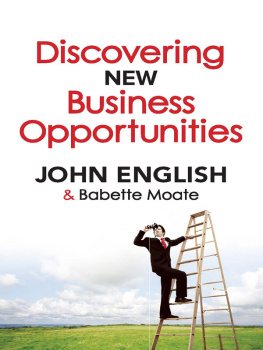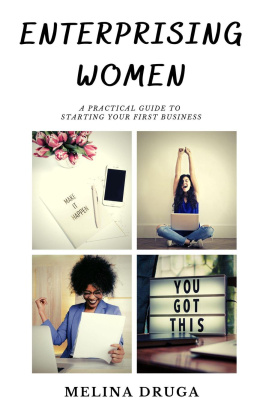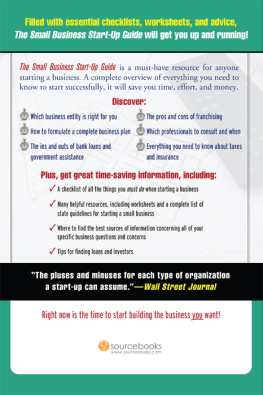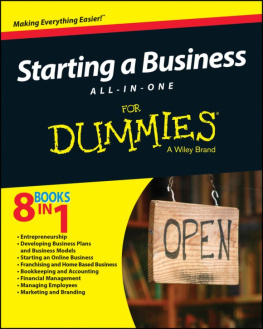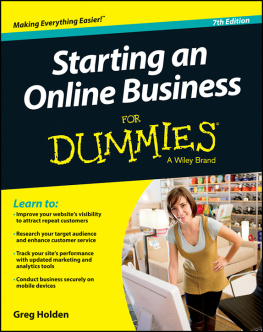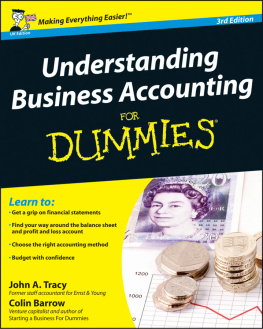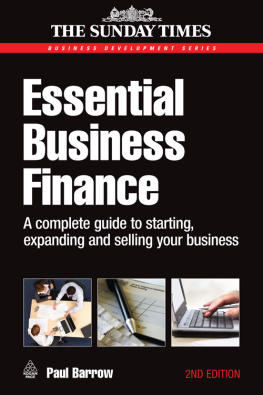Brian OKane - Finding Business Ideas
Here you can read online Brian OKane - Finding Business Ideas full text of the book (entire story) in english for free. Download pdf and epub, get meaning, cover and reviews about this ebook. year: 2011, publisher: Oak Tree Press, genre: Business. Description of the work, (preface) as well as reviews are available. Best literature library LitArk.com created for fans of good reading and offers a wide selection of genres:
Romance novel
Science fiction
Adventure
Detective
Science
History
Home and family
Prose
Art
Politics
Computer
Non-fiction
Religion
Business
Children
Humor
Choose a favorite category and find really read worthwhile books. Enjoy immersion in the world of imagination, feel the emotions of the characters or learn something new for yourself, make an fascinating discovery.

- Book:Finding Business Ideas
- Author:
- Publisher:Oak Tree Press
- Genre:
- Year:2011
- Rating:4 / 5
- Favourites:Add to favourites
- Your mark:
- 80
- 1
- 2
- 3
- 4
- 5
Finding Business Ideas: summary, description and annotation
We offer to read an annotation, description, summary or preface (depends on what the author of the book "Finding Business Ideas" wrote himself). If you haven't found the necessary information about the book — write in the comments, we will try to find it.
Finding an idea often is the hardest thing about starting a business. This guide shows you how to do so, how to decide what kind of business it will be and how to choose between starting, buying and franchising a business.
Finding Business Ideas — read online for free the complete book (whole text) full work
Below is the text of the book, divided by pages. System saving the place of the last page read, allows you to conveniently read the book "Finding Business Ideas" online for free, without having to search again every time where you left off. Put a bookmark, and you can go to the page where you finished reading at any time.
Font size:
Interval:
Bookmark:

Brian OKane is managing director of Oak Tree Press. He has written (or co- written) over a dozen books including the best-selling Starting a Business in Ireland and edited two of the worlds largest-circulation accounting magazines. He writes and speaks regularly on small business planning and strategy. He holds a BComm degree from University College Dublin and a Master of Business degree from Waterford Institute of Technology. He is a Fellow of Chartered Accountants Ireland and a member of the Marketing Institute of Ireland and the Institute of Management Consultants & Advisers.
Look around you. There are millions of businesses out there already. Some of them may be copyable, or adaptable, or may give you an idea for a new business.
Look at your skills and experience. Where could they be used? In particular, where could they be used to save other people money since thats the one thing that everyone is interested in. Can you think of ways in which people could save money and you could help them do so?
Alternatively, look at bigger businesses which often miss out on the personal element that is so important for good customer / business relationships and see whether you could start a similar business, on a smaller scale perhaps, but with that human touch?
Could you outsource work that you used to do from the business where you used to work? If you are being made redundant, this could form part of your exit negotiations.
Have you seen something on holidays a product, or service, or business that you could not find at home? Perhaps you could adapt this idea for your local situation?
The most obvious way of copying a good idea is by franchising it. Lots of businesses especially service businesses grow by franchising their business idea, and the underlying systems and brand, to other people.
This where the true entrepreneur comes in they see opportunities where no one else can.
Developing your idea to its fullest potential involves creative thinking. The creative thinking techniques below will help you to identify new ideas, develop your existing idea and create new opportunities.
- Get a group together (four people is the minimum, preferably more).
- Define a problem and then redefine it.
- Then brainstorm:
Aim to generate as many ideas as possible.
All ideas are acceptable.
The crazier the idea, the better.
- Select the craziest idea and brainstorm that idea.
For example, see how many uses you can find for a paperclip.
This technique is usually used when you are thinking of adapting or developing an existing product or service but it can be used to create a new product or service from an existing one.
Take the particular product / service and list its attributes: For example, shape, size, design, materials, colour, functions and cost. Then take each attribute and try to find as many alternatives to it as possible.
Tease out different perspectives and ideas with any product, service, problem or situation, using the six prompts above. For example, who buys product X now? If you wanted to make product X appeal to an entirely different group of customers, how would you have to change the product, its price and the way you market it to be sure that they would buy it?
List the assumptions of the problem or idea, then explore what happens if you drop assumptions. For example, why assume that this advice should be available only in ebook form. What if it were available as an MP3 download? How would that change the market for it?
Disrupt your own patterns:
- Programme interruptions in your day.
- Do something you have never done before or read something you would not normally read.
- Watch some different TV programmes.
Be careful, though its easy to be creative and to come up with clever ideas for possible businesses. Once the creative burst is over, look at your ideas again in the cold light of day and see whether they really stack up. Thats where your market research comes into its own.
This is more general advice perhaps than specific guidance on finding a business idea but its useful nonetheless.
If you can identify a sector that still thrives, even in a downturn, and can find a place for yourself in that sector, then not only will you create a business for now but you should be creating one that will flourish when the good times return. Examples of these kinds of sector include: green / environmental, education and IT.
Theres no doubt that some green initiatives will be undertaken in the next few years because they save people or the Government money, but theres a clear trend towards a greater awareness of things environmental just ask your children (or children of friends and neighbours), youll be amazed at how much more clued in they are than older people. Can you find somewhere within this trend where your skills and experience can be put to good use?
Or in education? In a knowledge economy, which is what we have today, this is essential, not just for children but for everyone. Lifelong learning is / was a buzzword but its a genuine and lasting trend too and one that offers lots of opportunities, if only you can find the right one for yourself.
And IT is the same. Yes, at one level, its the preserve of geeks, with their strange jargon and incomprehensible computer terms. But everyone uses computers, for almost everything, these days. If you can explain their use, manage them, keep them running, fix them, whatever, is there an opportunity there for you?
In most cases, people considering self-employment think first about starting their own business but there are alternatives.
Buying an existing business can be a sensible alternative to starting a business from scratch. The main advantage is that the business has existing products, markets, customers, staff, etc. and you dont have to build them all up yourself. The disadvantage is that, usually, a considerable investment is needed to acquire the business, and more money may have to be added to develop it further.
And, just like when buying a second-hand car, it is also important to know why the business is being sold perhaps the business is in trouble or is about to face major competition, which might depress profits in the future. This investigation is called due diligence and involves you (or an accountant or consultant on your behalf) examining:
- Financial data what do the figures show?
- Management and key staff how to retain them?
- Recent investments (or lack of).
- Product development / improvements (or lack of).
- Innovation (or lack of).
- Use of modern technology (or lack of).
- Hidden liabilities.
Due diligence is both time-consuming and expensive. Before you engage an accountant, ask the seller these questions:
- Why is the business for sale?
- What is the business of the company?
- How is it organised?
- What is its position in the market-place?
- What are its future prospects?
- Is there a current business plan? Can you have a copy to read?
Font size:
Interval:
Bookmark:
Similar books «Finding Business Ideas»
Look at similar books to Finding Business Ideas. We have selected literature similar in name and meaning in the hope of providing readers with more options to find new, interesting, not yet read works.
Discussion, reviews of the book Finding Business Ideas and just readers' own opinions. Leave your comments, write what you think about the work, its meaning or the main characters. Specify what exactly you liked and what you didn't like, and why you think so.


